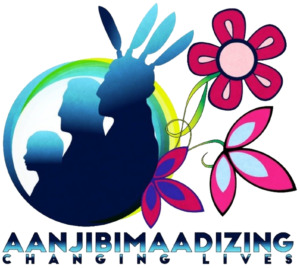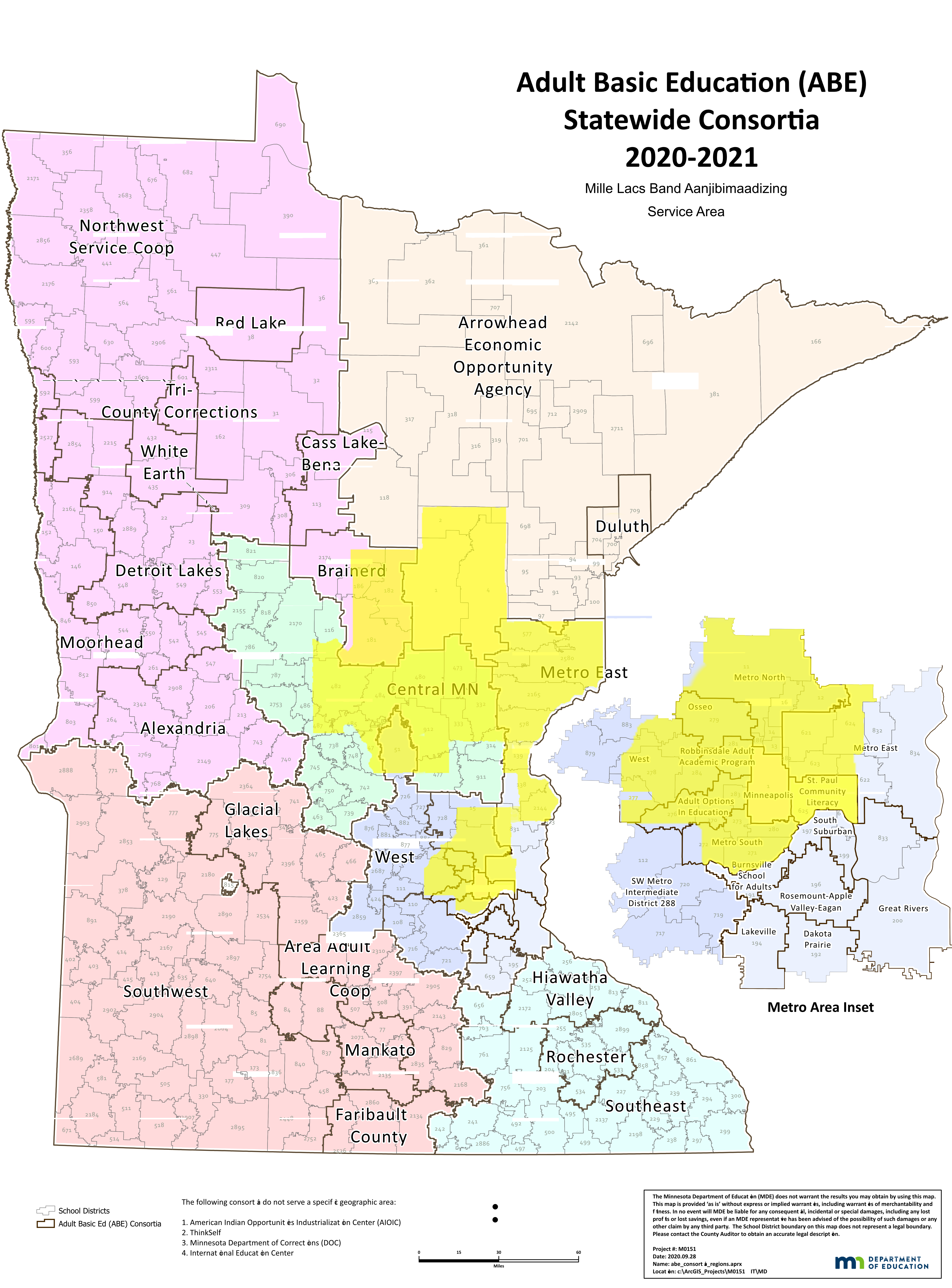SECTION NINE: ADDITIONAL REQUIRED INFORMATION FOR NEW PROGRAMS SEEKING AUTHORIZATION FOR STATE ABE FUNDING
9.1 CONSORTIUM’S CLASSIFICATION
Identify the consortium’s classification in seeking authorization as either: First-time applicant; ABE program that has previously been a member of an approved ABE consortium that is applying to become a new, restructured consortium; or ABE program seeking authorization due to performance issues.
The Mille Lacs Band of Ojibwe Aanjibimaadizing Program is classified as a first-time applicant.
9.2 GEOGRAPHIC AREA
- What adult student populations would the proposed consortium serve?
- How would the proposed consortium collaborate with existing consortia in the same geographic region?
- Why does it make more sense for the program to apply as a separate consortium instead of merging with another existing consortium?
Aanjibimaadizing’s clients include members of Federally recognized Tribes of all ages who reside within the counties of Aitkin, Anoka, Benton, Chisago, Crow Wing, Hennepin, Kanabec, Mille Lacs, Morrison, Pine and Ramsey counties. Our service area overlaps with twelve other consortia. The Aanjibimaadizing service area is highlighted in yellow on the current consortium map below.
With the exception of those living in the Urban area, most (possibly all) of our clients, who are working on their GED go through Aanjibimaadizing, or not at all. We are able to offer a safe and comfortable, holistic one-stop-shop to meet many of their needs and address their barriers directly. The services we provide are individualized and offered in a culturally appropriate way – our core belief is that ALL people should be treated with minwaadendamowin (respect) and zhawenjigewin (kindness). We also have an amazing staff that the clients enjoy working with, as much as we enjoy working with them.
Due to the number of consortia in proximity and the nature of urban settings we work with clients on an individual basis to find a place to test. Our preferred location is with the American Indian OIC Takoda Training Institute and we look forward to collaborating with them.
Aanjibimaadizing offers CASAS (academic level assessments), and assists with GED study and preparation, as well as related support services. We are very familiar with the entire ABE process, have the training and a vast amount of experience offering these services. Approximately 35% of our 825 adult clients (FY22) don’t have a diploma or GED.
Because we are not an ABE consortium, there are complications that arise:
- The assistance we are able to offer is limited. We are unable to administer GED testing in house and need to rely on area consortia to complete the process and provide testing. The biggest burden from this often falls on the client as they need to work with multiple agencies who have different processes.
- Transportation support is often needed for each of the 4 GED practice tests and 4 GED tests. The nearest locations for testing are:
- Central Lakes College in Brainerd (minimum distance 32 miles)
- Croix River Education District in Rush City (minimum distance 26 miles)
- Duluth Adult Education (minimum distance 62 miles)
- Cloud Technical & Community College (minimum distance 64 miles)
- Our service area overlaps with twelve other consortia. Different consortia need to be used for each of the Mille Lacs Band Districts so that the contact hours and funding go to the correct entity – based on the person’s residence. This generates increased costs and is a great inconvenience for the client.
- The contact hours for our clients are either counted by one of the above consortiums or not counted at all if services are provided in house.
9.3 ABE SYSTEM FAMILIARITY
Describe what actions the program has taken to familiarize staff with the ABE system.
Aanjibimaadizing, formerly known as the Department of Labor, had been assisting clients with obtaining their GED for many years. This involved administering the TABE, which was a requirement for many of our programs outside of ABE. We also provided study assistance and workbooks while working with the different consortia to provide ABE services.
The consortia most often used are/were:
- In D3, we work with the St. Croix River Education District for testing. (minimum distance is 26 miles) When it works better for the client, we refer them to the Hinckley-Finlayson ABE program for GED preparation.
- Previously, testing was done at Central Lakes College in Brainerd or Duluth Adult Education. (minimum distance is 62 miles)
- Testing is done at Central Lakes College in Brainerd (minimum distance is 32 miles) or occasionally St. Cloud Technical & Community College (minimum distance is 64 miles) depending on client location.
- Due to the number of consortia in proximity and the nature of urban settings we work with clients on an individual basis to find a place to test. Our current preferred location is with the American Indian OIC Takoda Training Institute. (distance is less than 1 mile)
We began using Essential Education’s GED Academy approximately 10 years ago.
After noticing that a large segment of the client population working on their GED began the process with elementary-level reading and math scores, Aanjibimaadizing pursued a partnership to provide Adult Basic Education. We had a partnership with Central Minnesota Adult Basic Education from 2019 to 2021. With this, Lead Instructors and the Training Manager became trained as ABE Volunteers. During this time we also began offering Northstar Digital Literacy. The partnership was discontinued when they no longer had an ABE instructor. (The former ABE instructor, Jessica Crafton, continues to be employed by Aanjibimaadizing and is a great asset to our program.)
In D2, we currently have an MOU with the Arrowhead Economic Opportunity Agency (AEOA) to provide services in McGregor. October through April, services are only available via Zoom.
9.4 WHAT INFORMATION OR DATA IS AVAILABLE FOR THE STATE TO DETERMINE FIRST PRIOR YEAR CONTACT HOURS?
What information or data is available for the state to determine first prior year contact hours? (First prior year is from May 1, 2022 to April 30, 2023.)
Data can be pulled from the following sources to determine first prior year contact hours:
- One Tribe Database
- GED Academy
- Arrowhead Economic Opportunity Agency
- Instructor Data Logs
- Classroom Daily Sign In/Sign Out sheets
- Cumulative Data Spreadsheet, where fiscal year (Our PL 102-477 fiscal year runs October 1 to September 30.) data is compiled for reports
As we are applying to be a new consortium, the data that follows represents education and training gains from the above sources during the last two fiscal years:
Training Data |
FY22 |
FY21 |
| Classroom Services | ||
| # of Client Contacts Made | 4,713 | 3,660 |
| # Adults Receiving Driver’s License Assistance | 443 | 483 |
| # Youth Receiving Driver’s License Assistance | 41 | 18 |
| # working on GED | 285 | 150 |
| Total Clients Assisted with Classroom Activities | 725 | 478 |
| Courses | ||
| # Offered that were Facilitated in House | 42 | 37 |
| # Offered that were Facilitated by Other Entities | 84 | 75 |
| Total number of Sessions Offered | 284 | 250 |
| Pine Technical and Community College Certificates Obtained | 62 | 52 |
| Cumulative total of those attending trainings offered through Aanji | 923 | 787 |
| Work Experience Training | ||
| Total Hours of Training Provided | 45,276 | 34,958 |
| Total # WEX Participants | 129 | 243 |
| Tutoring | ||
| # students that advanced to the next grade | 44 | Tutoring was not a separate program at this time. |
| # students tutored that graduated | 13 | |
| Total # of K-12 Students Tutored | 57 | |
| Ge-Niigaanizijig | ||
| # Graduated | 16 | 9 |
| # Entered College/Trade School | 8 | 2 |
| # Participating in Internships | 46 | Not offered |
| # Participating in Sports and Fitness Programs | 188 | 243 |
| Culture | ||
| Ojibwe Language Lessons | 110 | Programing was not available at this time. |
| Traditional Skills Trainings | 119 | |
| Ojibwe Rosetta Stone Participants | 3,438 | |
9.5 HAS THE PROGRAM BEEN IDENTIFIED AS A LOW-PERFORMING PROGRAM PREVIOUSLY?
Has the program been identified as a low-performing program previously?
● If so, please include details of the program’s history as a low-performing program or in provisional approval status, along with an explanation of what has been done to improve performance and address issues.
No.
In 2022 Aanjibimaadizing received the Department of Interior Chief’s Award. The Chief’s Award is given annually to one of the seventy-two P.L.102-477 grantees in the nation. Of these, Aanjibimaadizing was chosen as the program that best demonstrates excellence in service.
Over the last year, data, documentation for client services and our work participation rate (WPR) have mainly increased. The program continues to make significant improvements. In the few areas where we have seen decreases, it was largely due to pandemic effects. One example of this is having the number of Work Experience (WEX) participants decrease after businesses began re-opening.
We are also finding some programs, such as WEX, are beginning to reflect market saturation and our success as a program – clients are getting the support and services they need to meet their goals, establish self-sustainability, and no longer need to rely on our services.
For further information on department wide data from our last fiscal year (October 1, 2021 to September 30, 2022) please see our FY22 Highlights Infograph at https://aanji.org/wp-content/uploads/2023/02/FY22-Infograph-1-18-23.pdf .

